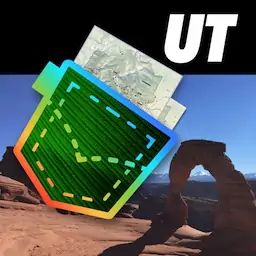by Alex Gugel , all rights reserved
Pleasant CreekCapitol Reef |
Brochure and Map of Pleasant Creek at Capitol Reef National Park (NP) in Utah. Published by the National Park Service (NPS).
featured in
| National Parks Pocket Maps |  | |
| Utah Pocket Maps |  |
Capitol Reef National Park
National Park Service
U.S. Department of the Interior
Pleasant Creek
Pleasant Creek is a year-round stream that has cut a deep, scenic canyon through the heart
of Capitol Reef. Exploring the length of the canyon requires numerous creek crossings; it is
often possible to jump over the creek, but stepping into the water may be necessary at times.
Dangerous flash floods are an occasional hazard on this route. Do not hike the Pleasant
Creek route if there is a chance of rain. Do not camp next to the creek.
Unmaintained yet noticeable footpaths exist along much of the route—please stay on these paths
where they exist in order to protect biological soil crusts. Do not walk or camp on areas of this
fragile soil crust. It has a lumpy, gray appearance, and helps prevent erosion of soft, sandy soils.
It is possible to explore the canyon in either direction from the trailhead as a day hike. Suitable
locations for backcountry campsites can be found in some sections of the canyon. Backcountry
permits are required for all overnight trips and can be obtained at the visitor center. Portions of
the Upper Pleasant Creek route are outside the park, on lands administered by the US Forest
Service (Fishlake National Forest).
Pleasant Creek
When hiking and camping along Pleasant Creek around mid-October, be advised that local
ranchers have permits from the park to herd cattle through Pleasant Creek Canyon at that time
of year. Choose campsites carefully, and stand clear of approaching cattle herds.
This route is not an official, maintained trail. Route conditions, including obstacles in canyons, change frequently due to
weather, flash floods, rockfall, and other hazards. Routefinding, navigation, and map-reading skills are critical. Do not
rely solely on unofficial route markers (rock cairns, etc.); they are not maintained by the National Park Service (NPS),
may not indicate the route in this description, or may be absent.
Note: Capitol Reef National Park recommends hikers do not ingest water directly from Pleasant Creek because E. coli
bacteria are occasionally detected in water samples taken from the stream. Sources of E. coli bacteria in Pleasant Creek
may include runoff from upstream agricultural and grazing land, cattle trailing, and human and wildlife waste.
Trailhead Locations
From the visitor center, travel 7.9 miles (12.7
km) south to the end of the paved portion of
Scenic Drive. Continue south for 2.8 miles (4.5
km) on the unpaved Pleasant Creek Road to
a small parking area and vault toilet adjacent
to Pleasant Creek. This is the trailhead; do
not continue on the rough road that crosses
Pleasant Creek (a rugged, unmaintained, four-
wheel-drive track known as South Draw Road).
It is also possible to access the upper end of the
Pleasant Creek route from the Tantalus Flats area,
west of the park boundary. This requires travel
on rough roads with high-clearance vehicles;
four-wheel drive may be required. The road may
be impassable at times, especially in winter.
Route Distances
(one-way)
From the trailhead at Pleasant Creek Road to:
• turnaround point at fence near east park boundary.................................................3.4 miles (5.4 km)
• west park boundary.......................................................................................................2.3 miles (3.7 km)
• Pleasant Creek cascades, west of park boundary (Fishlake National Forest).......3.8 miles (6.1 km)
Hike Description:
Lower Pleasant Creek
to east park boundary
From the trailhead next to Pleasant Creek,
follow a footpath leading to the east from the
parking area. Cross to the south side of the
creek after 0.3 mile (0.5 km), near a tall grove
of cottonwoods. From this point onward,
continue eastward along sandy benches and
streambanks, following informal trails and
crossing the creek as necessary, as the waterway
meanders between the canyon walls. About
2.1 miles (3.5 km) from the trailhead, the creek
flows over slickrock into a short, narrow chute
of red sandstone. About 1/4 mile (0.4 km) past
the chute, the main canyon widens and a large
side canyon joins Pleasant Creek from the
right (south); it is possible to explore the side
canyon for a short distance before obstacles
block passage. Around 0.5 mile (0.8 km)
beyond the side canyon, the route bypasses a
large southward meander in the main canyon
by crossing over a low sandstone saddle next
to the north wall of the canyon. After crossing
the saddle, return to the creek and follow it for
another 0.5 mile (0.8 km) to a fence that crosses
the creek bottom. Shortly beyond the fence is
the park boundary and private property. This
fence marks the end of the route. To return to
the trailhead, retrace your route westward up
the canyon to the Pleasant Creek Road.
Hike Description:
Upper Pleasant Creek
to west park boundary
(and beyond)
From the trailhead next to Pleasant Creek,
follow a footpath leading west along the north
side of the creek. After about one mile (1.6 km),
the canyon deepens and narrows, requiring
numerous creek crossings to continue further
up-canyon. Remnants of an old dirt road
continue up-canyon to the park boundary,
about 2.3 miles [3.7 km] from the trailhead; it
is possible to use these segments of eroded,
unmaintained road as a route of travel (and
as potential campsites). Continuing outside
the park onto US Forest Service property, the
canyon remains scenic and becomes somewhat
narrower. About 0.7 mile (1.1 km) west of the
boundary, the route passes through a narrow,
sharp curve in the canyon. Beyond this curve,
the landscape broadens somewhat, and the
route continues south along the west side
of Pleasant Creek. About 1/4 mile (0.4 km)
upstream (south) from the narrows, a small
stream joins Pleasant Creek from the right
(west). About 0.3 mile (0.5 km) beyond this
confluence, another stream joins Pleasant
Creek. At this second confluence, follow
Pleasant Creek (the right-hand stream) to the
west about 1/4 mile (0.4 km) to a series of small
cascades in a sandstone chute under ponderosa
pines. This destination serves as a turnaround
point. To return to the trailhead, retrace your
route down-canyon to the Pleasant Creek Road.
Rules and Regulations
Additional Information
• Free permits are required for backcountry
camping, and are available at:
♦♦Capitol Reef Visitor Center
♦♦Bullfrog Visitor Center (Glen Canyon NRA)
♦♦Anasazi State Park (Boulder, UT)
♦♦Escalante Interagency Visitor Center
• Dispersed/at-large camping with vehicles is
prohibited within the park, including at or
near trailheads. Dispersed/at-large camping
is allowed on federal lands (USFS, BLM)
adjacent to the park.
• Pets are not permitted on trails or in off-trail
or backcountry areas. Pets are permitted on
roads and in designated campgrounds.
• Fires are prohibited.
• Collecting or damaging any park resource
(plants, animals, wood, rocks, bones, antlers,
artifacts, etc.) is prohibited.
• Violation of these regulations may result in a
citation.
Best season:
For more information:
Spring and fall, and summer if there is no
chance of rain.
Contact the Capitol Reef Visitor Center at
435-425-4111.
Maps:
South Draw Road (extremely
rough, unmaintained; high
clearance & 4WD required)
Trailhead
1.2mi
1.9km
Upper Pleasant Creek route
First creek crossing
Distance between
points
Contour interval - 40 feet
2.1mi
3.5km
0.5mi
0.8km
Unpaved road
Hiking route
Slickrock chute
Lower Pleasant Creek route
1.1mi
1.8km
Pleasant Creek Road
(to visitor center
and Highway 24)
Shortcut saddle
1.3mi
2.0km
Turnaround point:
fence across creek
USGS 7.5-minute series: Golden Throne.
Maps available at the visitor center.
ry
Turnaround point:
small cascades
0
0.9mi
1.4km
Start of short
narrows
0.5 mi
0
North
Trailhead
Pleasant Creek Road
(to visitor center
and Highway 24)
South Draw Road (extremely
rough, unmaintained; high
clearance & 4WD required)
1 km
0.7mi
1.1km
1 km
0
0.5 mi
Pa
0
rk
b
North
ou
nd
a
EXPERIENCE YOUR AMERICA
www.nps.gov/care
5/15


